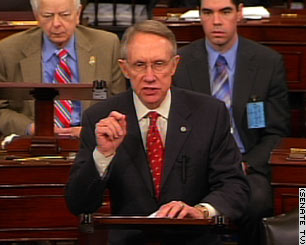Senate won't vote on objection to troop buildup
By weee_ann
@weee_ann (1453)
Philippines
February 17, 2007 6:46pm CST
WASHINGTON (CNN) -- Senate Democrats failed to garner the 60 votes they needed to consider a nonbinding resolution opposing President Bush's plan to send more troops to Iraq.
The vote was 56-34, with seven Republicans crossing the aisle to vote with senators who oppose the troop buildup.
The measure was identical to a nonbinding resolution the House passed Friday denouncing the plan to send 21,500 additional troops to Iraq."We are policing a civil war in Iraq," Sen. Charles Schumer, D-New York, said before the vote. "American troops should not be in the middle of that war."He added, "The president's escalation is misguided, to put it kindly."
The Saturday vote was a procedural decision on whether the Senate should move on to a final vote on a resolution that expresses opposition to Bush's plan.
Republicans pushed for an amendment by Sen. Judd Gregg, R-New Hampshire, that would address funding of the war, which they said would make the vote meaningful."This nonbinding resolution, as a practical matter, doesn't do anything, but was designed to try to disapprove of the new mission," Minority Leader Mitch McConnell, R-Kentucky, said after the vote. "Our view is you cannot discuss the new mission in Iraq without discussing funding for the troops."
McConnell said the Senate should have considered another resolution, put forward by Republicans John McCain of Arizona and Lindsey Graham of South Carolina and independent Joe Lieberman of Connecticut, which includes benchmarks to measure Iraqi progress toward security goals.
In a written statement after the vote, White House press secretary Tony Snow urged Congress to approve Bush's funding request for the military."It would enable the world's most capable military force to remain the most advanced in terms of training, equipment, doctrine and -- most importantly -- the quality of the men and women who serve," Snow said.
Graham said politics made Democrats afraid to allow a vote on funding the war."If you did have this vote, the left -- the radical left -- would eat every Democratic hopeful for president alive," Graham said. "That's why we're not having this vote. The hard left wants out of this war yesterday."Senate Republicans succeeded earlier this month in blocking a vote on a similar resolution. Majority Leader Harry Reid of Nevada urged Senate Republicans to drop their procedural moves.
In the House, 17 Republicans joined Democrats on Friday in passing the two-sentence resolution. It expresses support for U.S. troops in Iraq but states that Congress "disapproves" of Bush's troop increase.
On February 5, all but two GOP senators voted to block debate on the similar resolution. Saturday's vote saw five more GOP senators join the Democrats.
They were Sens. John Warner of Virginia, Norm Coleman of Minnesota, Susan Collins of Maine, Chuck Hagel of Nebraska, Gordon Smith of Oregon, Olympia Snowe of Maine and Arlen Specter of Pennsylvania."We support the president on the diplomatic aspects of his plan. We support the president on the economic aspects of his plan," Warner said."We only disagree with one portion of it: Mr. President, do you need 21,500 additional men and women of the armed forces in this conflict?" Warner said.
Sen. Carl Levin, a Michigan Democrat, backed the chance to vote on the resolution."If we believe plunging into Baghdad neighborhoods with more American troops will not increase chances of success, we are duty-bound to say so," Levin said.
GOP insisted on 'measure of fairness'
Republican leaders insisted that members get a chance to vote on two GOP alternatives, and that the process be conducted under rules that called for 60 votes to pass.
Republican critics have claimed that passing the resolution could lead to a cutoff in funding for the troops.
Minority Leader Mitch McConnell, R-Kentucky, said before the vote that Republicans would insist on "a measure of fairness," allowing them to offer alternative resolutions -- including one stating the Senate won't cut off money for troops in the field."If we have only one alternative, it will involve a vote on funding the troops," McConnell said.
Published polls indicate a solid majority of the U.S. public opposes the Bush plan, and Democrats said the November election victories that put them in control of Congress show Americans want to wind down the nearly four-year-old war.
Bush challenges Congress not to cut funding
Bush noted Thursday that the Senate recently confirmed the promotion of Gen. David Petraeus, the new commander of U.S. troops in Iraq, even as members criticized the strategy he was installed to pursue.
Secretary of State Condoleezza Rice made an unannounced visit to Iraq on Saturday on her way to meet with Middle East leaders. She told troops there that despite the political debate, their efforts are appreciated back home.
Though the president said lawmakers "have every right to express their opinion," he demanded they support an upcoming spending bill that would commit nearly $100 billion more to the war effort. "Our men and women in uniform are counting on their elected leaders to provide them with the support they need to accomplish their mission," Bush said.
No responses





